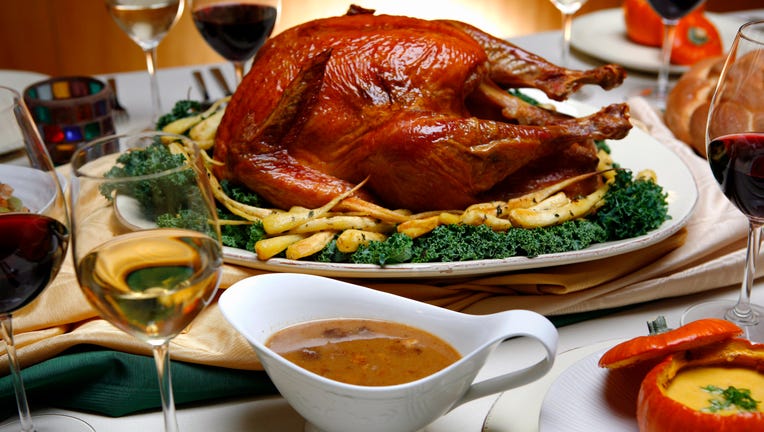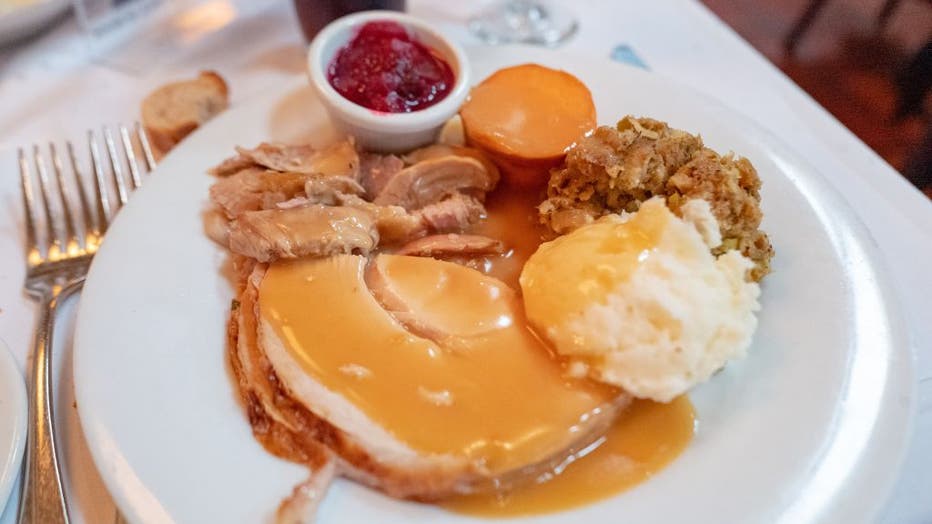Hosting Thanksgiving? Amid coronavirus pandemic, you may need to rethink your dinner plans: expert

A feast for Thanksgiving dinner is shown in a file image taken on Nov. 2, 2007. (Photo by Jay L. Clendenin/Los Angeles Times via Getty Images)
Thanksgiving is soon upon us, and after a year of ups and (mostly) downs, people are looking forward to the cheerful comfort of the holidays.
However, before you start counting out place settings — or Zoom invites — Dr. Erika Schwartz, an internist specializing in disease prevention, has some safety tips to keep you and your loved ones happy, and most importantly, healthy, this season.
Plan the guest list
As Dr. Anthony Fauci cautioned in recent interviews, positive cases are spiking across the nation. Some of these increases are even traced back to dinner parties and small gatherings, he said.
With that in mind, Schwartz also emphasized the importance of keeping gatherings small. The Centers for Disease Control and Prevention (CDC) recommends citizens avoid traveling to friends' or relatives' homes and only hosting dinner guests who reside in a single household.
"Do not get on planes for dinner," she said, adding that any Thanksgiving celebration that involves lengthy travel should be skipped.
And when it comes to the already-slashed invite list, Schwartz says to keep the following in mind: What have these people been doing? Have they been quarantining? Do they work in, or are they coming from a place with a lot of positive cases? Who have they been with for the past two weeks? Will they practice social distancing or wear a mask when not?

The CDC has released their guidelines for celebrating Thanksgiving amid the coronavirus pandemic. (Photo by Smith Collection/Gado/Getty Images)
Change the menu
“The good thing about Thanksgiving and holidays is the coronavirus is not spread through food,” said Schwartz. "[But] don’t do food that is shared.”
Instead of family-style plating, with people passing platters around, keep the food in the kitchen – or some other separate space – and have people take turns going in, while socially distancing, and serving themselves using clean utensils, she advises.
And make sure no one is double-dipping — although, as Schwartz points out, it's wise to "not double-dip,” pandemic or no pandemic.
Create a warm, and socially distanced environment
“Keep the windows open and use spaces and all areas of the house that you can,” Schwartz said, noting that guests should practice social distancing even while seated. “If you’re in a climate where you can eat outside, do that.”
“Social distance, and then after they leave, you clean and disinfect,” Schwartz continued. “If we respect each other and put the other one’s health and wellness ahead of ourselves, then we’ll behave better and the outcome will be better.
It should be noted, however, that the CDC considers small outdoor dinners — even with only friends and family from the same community in attendance — as a "moderate risk activity."
Be open and honest with your family and friends
“Learn how to communicate better with your family and explain your comfort level around people coming to your home,” Schwartz said, adding that hosts should be especially open when informing friends or family members that they may not be invited this year.
“If you’re not inviting someone, you should be able to explain why. And same if someone doesn’t want to come, you should give them the opportunity to tell you. Because you’re respecting them and they’re respecting themselves.”
“People have different comfort levels,” she added.
Go easy on the video calls
“The problem with Zoom is it’s not really intimate,” Schwartz said.
Instead of feeling disappointed by virtually connecting during dinner, Schwartz suggests protecting your mental health by sending a recorded video message wishing a happy Thanksgiving to family members you can’t be with, and focus on those you can be with.
For more information and recommendations for a safe holiday from the CDC, visit the agency's website here.

